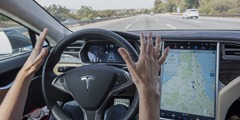 Some experts have dirty minds.
Some experts have dirty minds.
That’s the only conclusion I can draw from this piece in the Toronto Sun in which an expert reflects that driverless cars would lead to “a lot more sex in cars.” Of course, sadder still is the fact that he’s almost certainly right. People can and have had auto accidents already on account of, ahem, distracted driving of that nature. How much worse will it be when there’s not even any driving to distract from? Some people like to do those things in the darnedest places—just look at the so-called “mile-high club.”
But in actuality, the quantity of people boinking while leaving the driving to their car would almost certainly be a minority of car owners and passengers. A highly visible minority (especially if they don’t have their windows tinted), but I’m pretty sure most self-driving car owners would actually not be fastening on some other kind of “protection” than seat belts for their, ahem, ride.
But double entendres and sensationalistic headlines aside, the overall question of distraction while self-driving is an important one as it relates to doing things that most drivers probably would want to do. Things like checking their social networks or e-mail, playing Sudoku…and, of course, reading e-books. As automatic driving systems in cars like Teslas now stand, drivers are being far too trusting of the automation.
The auto-pilot system Teslas have isn’t true automatic pilot—it’s more like cruise control that also steers, but not perfectly. As such, drivers are expected to keep their eyes on the road even when their hands aren’t on the wheel, because they might need to take over at any moment to avoid accidents.
“Drivers tend to overestimate the performance of automation and will naturally turn their focus away from the road when they turn on their auto-pilot,” said the [Canadian Transport Minister’s briefing] note, obtained by The Canadian Press under the Access to Information Act.
Indeed, the notes cite media reports of videos posted online showing Tesla drivers engaged in questionable practices, including reading a newspaper or brushing their teeth. Other videos show Tesla owners recording flaws in how the car’s autopilot system reacts to changes in road markings.
But this in turn raises the question: how smart will a car need to be before it’s safe not to pay attention to the road? Will they ever get there? When people think of self-driving cars, they think of being able to do other things while the car trundles along, just as you would if you were sitting in the shotgun seat while another human being drove you somewhere. Catching up on your e-reading, for instance. Having to watch the car while it drives you doesn’t seem a lot more restful than just driving it yourself.
Google doesn’t even rate a mention in the article, but of course it’s working on a full-service self-driving car, rather than equipping ordinary cars with fancy cruise control. And given a few years, it may even be possible to have a car that doesn’t even have a steering wheel in it—in which case passengers basically wouldn’t have any choice but to read. And then there’s phone and console hacker George Hotz, who has been working on his own self-driving car system that he claims puts Tesla’s to shame. So we’ll get there sooner or later.
Until then, we will just need to remember not to bury our noses in a book if we should be in a car with the auto-drive switched on…or to bury other body parts in other things, either.































Estimates are of 10 million autonomous cars by 2020.
http://www.businessinsider.com/report-10-million-self-driving-cars-will-be-on-the-road-by-2020-2015-5-6